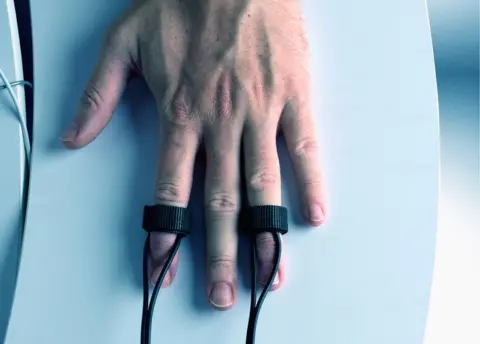Love Island: Can you trust the lie detector?
 ITV2
ITV2Love Island is reaching its final stages, and this is where the competition gets real.
Contestants are being put through lie detector tests, with questions set by their partners in the TV villa.
Jack Fowler, Dr Alex and Jack Fincham failed to impress their on screen girlfriends, but it's the tests themselves that have raised suspicions with some viewers on social media.
Allow X content?
Allow X content?

"Polygraph tests have to be taken seriously," says Don Cargill, who has carried out lie detector tests on TV shows including Trisha. "There's a lot to them."
A polygraph is the technical name for a lie detector machine.
Don says there are several problems with the way tests are carried out on Love Island.
Firstly, the questions themselves.
Monday night's episode saw male contestants asked, "Would you be tempted by other girls on the outside?" and "Do you think you'll struggle to stay faithful?", among other questions.
Allow X content?
Don says those questions won't give an accurate result because they are hypothetical.
"The polygraph only measures fact, so you can't ask about what someone intends to do.
"You have to ask something specific - like 'Did you have sex with someone other than your wife during the marriage?'."
A polygraph works by recording changes in a person's blood pressure, pulse, and other factors.
"When a person tells lies their heart rate increases. That's what we're measuring, as well as the sweat gland activity, because you do sweat more when you tell lies."
Meanwhile, body language expert Darren Stanton says there are several other physical signs that a person could be lying.
 ITV2
ITV2"If someone looks up and to the left when they've been accused of something, their breathing increases, and blood drains from their lips - five or six sudden changes like that and it indicates they're being deceptive," he tells Newsbeat.
Don explains that a lie detector test must be done in a strictly controlled environment - one unlike Love Island.
"The room has to be quiet. There can't be distractions.
"And the person who is accusing them or doubting them certainly can't be in the room."
While the Love Island contestants are in a relatively private space during the test, it's safe to say they are pretty distracted - knowing that their partners, and viewers at home, are eagerly studying their answers.
 Getty Images
Getty ImagesDon says that around three quarters of private polygraph testing in the UK is between romantic partners, to find out if one has cheated.
"And about half the people who take the test for infidelity do fail it, which is heartbreaking."
Some businesses also use polygraphs to help screen potential employees.
"Companies will want to know things such as, 'Has the person used illegal drugs?' or whether they've previously been fired from a job for theft, for example.
"But polygraphs need to be used alongside other tests. It's not the case that if you fail the test you'll not get the job."
 ITV2
ITV2It is difficult to assess how much polygraph results should be trusted.
The American Polygraph Association claims they are more than 90% accurate when carried out by an expert under the correct conditions.
But Don says methods must improve for them to become more widely trusted - and used, for example, in UK court cases.
"Until we develop them to be 100% accurate there will always be doubt."
